- Home
- Will McIntosh
Defenders
Defenders Read online
orbitbooks.net
orbitshortfiction.com
Begin Reading
Table of Contents
A Preview of Love Minus Eighty
Orbit Newsletter
Copyright Page
In accordance with the U.S. Copyright Act of 1976, the scanning, uploading, and electronic sharing of any part of this book without the permission of the publisher constitutes unlawful piracy and theft of the author’s intellectual property. If you would like to use material from the book (other than for review purposes), prior written permission must be obtained by contacting the publisher at [email protected]. Thank you for your support of the author’s rights.
To James Pugh
PART I
INVASION
Prologue
Lieutenant Enrique Quinto
June 26, 2029. Morris Run, Pennsylvania.
It was a quaint Pennsylvania town, many of the buildings well over fifty years old, with green canopies shading narrow doorways. Even the town’s name was quaint: Morris Run. If not for the abandoned vehicles, filthy and faded by two years of exposure to the elements, and the trash stacked along the sidewalk, Quinto might have expected someone to step out of the Bullfrog Brewhouse and wave hello.
“Lieutenant Lucky?” Quinto turned to see Macalena, his platoon sergeant, making his way to the front of the carrier. Quinto wished he’d said something the first time someone called him Lucky, but it was far too late now. Most of the troops he was leading today probably didn’t know his real name.
“One of the new guys shit his pants,” Macalena said when he drew close, his voice low, giving Quinto a whiff of his sour breath.
Quinto sighed heavily. “Oh, hell.”
“The kid’s scared to death. He hasn’t been out of Philadelphia since this started.”
“No, I don’t blame him.” Quinto looked over Macalena’s shoulder, saw the kid perched on the side of the carrier, head down. He was about fourteen. The poor kid didn’t belong out here. Not that Quinto couldn’t use him; they called raw recruits “fish food,” but sometimes they were surprisingly effective in a firefight, because they were too scared to think. The starfish could get less of a read on what they were going to do, which way they were going to point their rifles. Usually the newbies didn’t shit their pants until the shooting started, though. “Does he have a spare pair?”
Macalena shook his head. “That’s the only pair he owns.”
Quinto reached into his pack, pulled out a pair of fatigue pants, and handed them to Macalena. “I hope he’s got a belt.”
Macalena laughed, stuck the pants under his armpit, and headed toward the kid.
What an awful thing, to be out here at fourteen, fifteen. When Quinto was fourteen, he’d spent his days playing video games, shooting bad guys in his room while Mom fetched fruit juice and chocolate chip cookies and told him when to go to bed.
They reached the end of the little downtown, which was composed of that single road, and the landscape opened up, revealing pine forest, the occasional house, mountains rising up on all horizons. There was little reason for any Luyten to be within eight miles of this abandoned backwater town, but they were all out there somewhere, so there was always a chance they’d be detected.
Quinto tried to access his helmet’s topographical maps, but the signal still wasn’t coming through. He pulled the old hard copy from his pack, unfolded it.
The carrier slowed; Quinto looked up from the map to see what was going on. There was a visual-recognition drone stuck in a drainage ditch along the side of the road. As they approached, the VRA drone—little more than a machine gun on treads—spun and trained its gun on each of the soldiers in turn. When it got to Quinto, it paused.
“Human. Human!” Quinto shouted, engaging the thing’s vocal-recognition failsafe. It went on to the next soldier.
It was always an uncomfortable moment, having a VRA drone point a weapon at you. You’d think it would be hard to mistake a human for a Luyten.
Failing to identify anything that resembled a starfish, the gun spun away.
“Get a few guys to pull it out of the ditch,” Quinto said. Four troops hopped out of the transport and wrestled the thing back onto the road. It headed off down the road, continuing on its randomly determined route.
Pleasant Street dead-ended close to the mouth of the mine, about half a mile past an old hotel that should be coming up on their left. When they got to the mine they’d have to unseal it using the critical blast points indicated on the topo map, then a 2.5-mile ride on the maglev flats into the mine, to the storage facility.
If someone had told Quinto two years ago that he’d be going into an abandoned mine to retrieve seventy-year-old weapons and ammo, he would have laughed out loud.
It wasn’t funny now.
The locomotive and five boxcars were parked right where they were supposed to be—as close to the mouth of the mine as the track would allow. They were late-twentieth-century vintage, the locomotive orange and shaped like a stretched Mack truck. Quinto called Macalena and his squad leaders, instructed them to set the big recognition-targeting gun they’d brought along in the weeds on the far side of the road, and place two gunners near the entrance with interlocking fire. When that was done, they got the rest of the squads moving down the tunnel. The quicker they moved, the sooner they’d be out of hostile territory and back in Philly.
Quinto took up the rear of the last carrier for the ride down into the mine. He was not a fan of deep holes with black walls, and when his CO had first laid out the mission Quinto had nearly crapped his own pants.
Macalena climbed in and took the seat beside him.
“So what are we looking for? I cannot for the life of me guess what we’re doing in here.”
Quinto smiled. It must seem an odd destination to the rest of the men, but they were used to being kept in the dark about missions. The fewer people who knew, the less likely the starfish were to get the information. Or so the logic went.
“The feds have been sealing huge caches of weapons in old mines for the past two centuries, waiting for the day when Argentina or India or whoever took out our more visible weapons depots. They coat them in Cosmoline and pretty much forget about them.”
Macalena frowned, sticking out his big lower lip. “You mean, old hand grenades and machine guns and shit?”
“More or less. Flamethrowers with a pathetically limited effectiveness range, eighty-one-millimeter mortars, LAW rockets, fifty-cal MGs.” Most were outdated weapons, but simple, easy to operate.
Macalena shook his head. “So we’re that desperate.”
In the seat in front of them a private who was at least seventy was clinging to the bar in front of her seat. She was tall—at least six feet. The slight jostling of the carrier was clearly causing her old body discomfort. It was true what they said: There were no civilians anymore, only soldiers and children.
“Yup. We’re that desperate,” Quinto said. “They’ve destroyed or seized so much of our hardware that we have more soldiers than guns.”
“What’s Cosmoline?” Macalena asked.
“I didn’t know, either; I had to look it up. It’s a grease they used back in the day to preserve weapons. Once you chip away the hardened Cosmoline, the weapons are supposed to be like new.”
Macalena grunted, spit off the side. “Dusty as hell in here. And cold.”
“Let’s be glad we’re not staying.”
Macalena’s comm erupted, a panicked voice calling his name.
“What have we got?” Macalena asked.
“Vance is dead. Lightning shot, from the trees to the left of the mine.”
“All stop!” Macalena shouted. The carrier slowed as Quinto dropped his head, covered his mouth as the implications sun
k in.
Lucky no more.
“Where are you now?” Macalena asked the private.
“Inside the mine, about a hundred yards.”
“Stay there.”
Quinto looked up at Macalena, who raised his eyebrows. “What do you want to do?”
He wanted to get as deep in the mine as he could, and stay there, their backs against the wall, weapons raised until the starfish came to get them. Of course the Luyten would never come down, because they were reading his thoughts right now. Plus it was far easier to blow the mouth of the mine and leave them to suffocate.
Quinto ordered the small caravan to turn around and head toward the mouth.
They barely got moving before they heard the flash-boom of a Luyten explosive. The cave shook; bits of dirt and debris spewed at them, then everything settled into silence, the cave now truly pitch-black, save for the carriers’ headlights.
They climbed out of the carriers. Some of the troops cried, and there was no shame in that. One woman went off to the side of the tunnel and knelt in the rubble to pray. Quinto didn’t know their names, because he hadn’t served with them long. Troops came, and died, and new troops came. Only Lieutenant Lucky went on, mission after mission. Quinto realized he’d begun to believe he really was lucky, or special. Destined to see the war to its end.
It killed him, to think he wouldn’t get to see how things turned out, whether the bad guys won, or the good guys pulled something out of their asses at the eleventh hour.
Quinto used the walkie to apprise HQ of their situation, so HQ wouldn’t wonder when Quinto’s platoon never returned.
“Lieutenant?” Macalena said. He was studying the topo map he’d borrowed from Quinto. “Did you see these?” A few of the enlisted came over to look at the map over Macalena’s shoulder as he ran his finger along black lines set perpendicular to the mine. “There are five vertical shafts sunk along the length of the mine. I’m guessing they were escape routes in case of collapse, or ventilation, or both.”
Quinto looked up from the map, impotent rage rising in him. “Jesus, Mac, couldn’t you have waited a half hour to notice this?”
It took Macalena a second to understand. When he did, he grimaced, curled his hand into a fist, crumpling a section of the map. He turned and walked a dozen paces down the shaft, cursing quietly, viciously.
Even Macalena was too green for this war. He’d been in the infantry for only four months; before that he’d been writing military technical manuals. The army needed fighters more than writers these days.
If Macalena had waited even fifteen, twenty minutes before examining the old map, chances were the Luyten would have been out of range, and they could have climbed out of this hole and gone home.
“We need to move,” Quinto said. “The fish are going to find those exits and seal them up. Spread out, find the exits. When I get to the surface I’m going to set off a Tasmanian devil, give us some breathing room. As soon as it’s spent, get out there. Understood? Let’s move.”
“Couldn’t we just stay down here? Dig our way out when they’re gone?” It was the kid who’d crapped himself, looking absurd in Quinto’s big pants. “If we go up there now, they’ll kill us. I mean, maybe they’ll get distracted by something and leave…” He trailed off.
Everyone stared at the ground, except for the soldier who was praying.
“Let’s go,” Quinto said.
Quinto grasped the cold rung of the ladder that had dropped down when they unsealed the iron hatch.
“Good luck to you, Lieutenant,” one of the troops waiting to follow him called. It was Benneton, the old woman. The kid who’d crapped his pants was there as well, along with four others.
Quinto looked up into darkness. “Here we go.” He headed up the ladder. A lot of people who’d been as lucky as Quinto might have been tempted to believe the streak would hold, but Quinto knew his past held no hint of his future. More to the point, he knew he had no future.
It was a forty-foot climb according to the map, but adrenaline made it effortless. When he reached the top, he twisted the seal on the hatch, then pushed with his back and shoulders to force the hatch open. Daylight flooded into the dusty shaft as dirt and moldy leaves rained down on him.
The kid, who was just below him, passed up the Tasmanian devil. Reaching among the big spines jutting from the central carbon-fiber sphere, Quinto activated it, tossed it outside, and pulled the hatch closed.
The buzzing of razor-sharp shrapnel hitting, and then burrowing around inside everything within five hundred yards, would have been reassuring if Quinto weren’t absolutely certain the starfish had retreated outside the Tasmanian devil’s range as soon as Quinto thought about using it. At least it would back the fish up so they wouldn’t be able to pick off Quinto and his troops as they climbed out of their holes.
“Here we go,” Quinto said to the boy. “Have your weapon out. Run as fast as you can. Try to take one with you.” His guess was that Benneton would stay behind, shoot from the cover of the shaft until the Luyten cooked her. That’s what Quinto would do in her situation; it would probably afford her a few more minutes of life. He took a deep breath, trying to grasp that this was the end, this was the moment of his death, but he couldn’t.
As soon as the Tasmanian devil went silent, Quinto threw open the hatch, his heart thudding wildly, and ran.
Their carriers were trapped in the mine, so his best chance would be to make it to the locomotive. Of course the Luyten would have fried the locomotive, so really there was nothing to do but run, and when the fish closed in, turn and fight.
Two hundred yards ahead, he spotted four of his troops running north, into the woods, toward the nearest cover. That probably made more sense than what Quinto was doing, but all of the moves open to them were losers. It was always the same: The fish knew their exact location, but they had no idea where the fish were. If you could catch a fish out in the open, it couldn’t dodge automatic weapons fire, but you almost never caught them out in the open.
Quinto glanced back, saw the kid was two steps behind, his dirty cheeks tracked with tearstains.
The locomotive had been melted to a lump. He kept running. Everyone but he and the kid had headed north. Since Quinto wasn’t dead yet, it was safe to assume the fish had gone after the larger group first. If he could get outside their range, which meant seven or eight miles, he and the kid might have a chance. Quinto pushed himself to pick up the pace, but when he did the kid started to fall behind, looking panicked. Quinto slowed.
In the distance, Quinto heard the worst sound in the world: the sizzle-crackle of a Luyten lightning stick, a sound as much felt in your body as heard by your ears. Then another. He was spared the pungent, unearthly sweat smell of the weapon. He was too far away.
When he’d made it through the town, Quinto took another glance back. The kid was a hundred yards behind, one hand clutching his side. No way this kid was going to run another four or five miles. Panting, his throat coated in phlegm, Quinto considered leaving him behind. No. No matter how fast he ran, he wasn’t going to outrun Luyten on foot. He could try calling HQ and beg for a carrier to come get him, but they’d only tell him what he already knew: They weren’t going to feed the fish any more than they had to.
So he stopped, pulled out his comm, and waited for the kid to catch up. The kid stopped beside him, put his hands on his knees.
“You want to call anyone? Your mom or dad alive?”
The kid eyed the comm. “Just my little sister.” He swallowed, looked at Quinto. “We’re going to die, aren’t we?”
“Yeah. We are.”
“Maybe they got distracted by something. Maybe the others killed them.”
“Maybe,” Quinto said. He thought he heard the snap-crackle of something moving through the woods to the north. “Come on.” He tugged the kid’s jacket and headed into the woods on the opposite side of the road.
Should he call his own mother to say goodbye? He would like that, but he
didn’t want to risk having her on the line when he died. He didn’t want that to be her last memory of him.
Branches whipped his face as he tore through the brush. It was pointless, but he couldn’t relinquish that last millimeter of hope that he might get lucky, just one last time. He barreled down a slope as the landscape opened, then splashed through a stream and raced up the bank.
He spotted a flash of crimson ahead, behind a thick cover of green leaves, and stopped short. The kid stopped short beside him, looked at him, questioning, just as a bolt of lightning burst through the foliage.
1
Oliver Bowen
March 9, 2030 (nine months later). The South Pacific.
The door was locked. The room was comfortable, replete with a well-stocked kitchen and an entertainment system that was so up-to-date it contained movies yet to be released. But the door was locked.
You’re considered a risk. They don’t know the extent of my power to influence you.
Oliver turned in his rotating chair to face Five, whose accommodations were less plush. Behind the carbon alloy mesh that separated them, Five’s room was empty except for a water dispensation device that resembled a giant hamster lick. Five was lying flat, his appendages splayed like the spokes of an elephant-sized wheel. His skin had a stony, mottled texture, and there were bristles protruding at evenly spaced intervals across it. The cilia protruding from the tips were as thick as nautical rope, and transparent.
“Because you were able to win over a thirteen-year-old boy, they think you might be able to convince me that I’m fighting on the wrong side? That’s absurd.”
But they don’t know that, Five said. They think you’ve become too familiar with me. Too friendly.
The CIA yanks him out of his position at NYU three days after the invasion begins, shifts him from Research to Interrogation as their field agents die off, tells him to figure out how to communicate with Luyten, and when he succeeds, he becomes a suspected sympathizer? Beautiful.

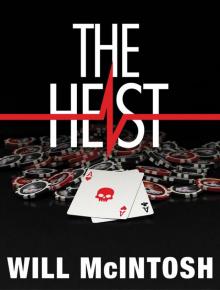 The Heist
The Heist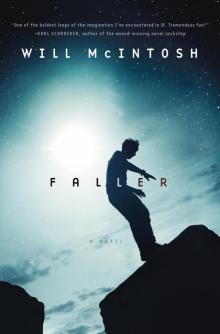 Faller
Faller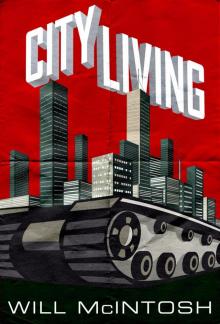 City Living
City Living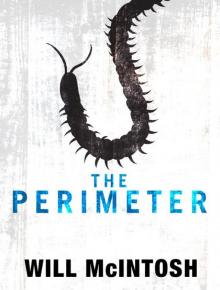 The Perimeter
The Perimeter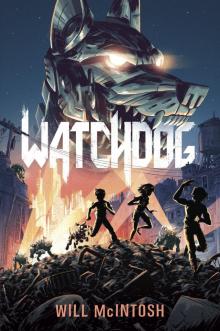 Watchdog
Watchdog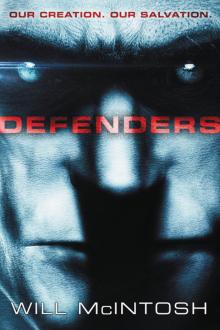 Defenders
Defenders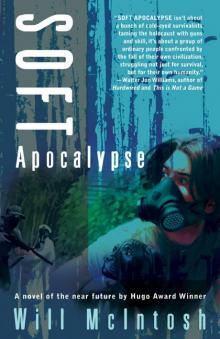 Soft Apocalypse
Soft Apocalypse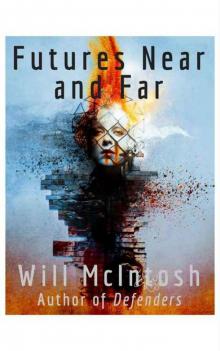 Futures Near and Far
Futures Near and Far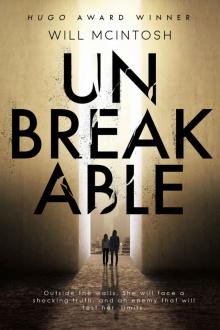 Unbreakable
Unbreakable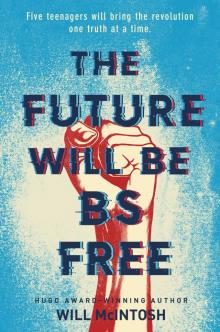 The Future Will Be BS Free
The Future Will Be BS Free Hitchers
Hitchers Burning Midnight
Burning Midnight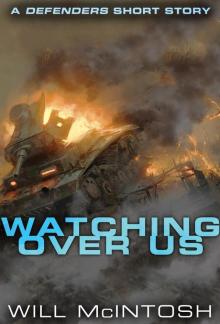 Watching Over Us
Watching Over Us